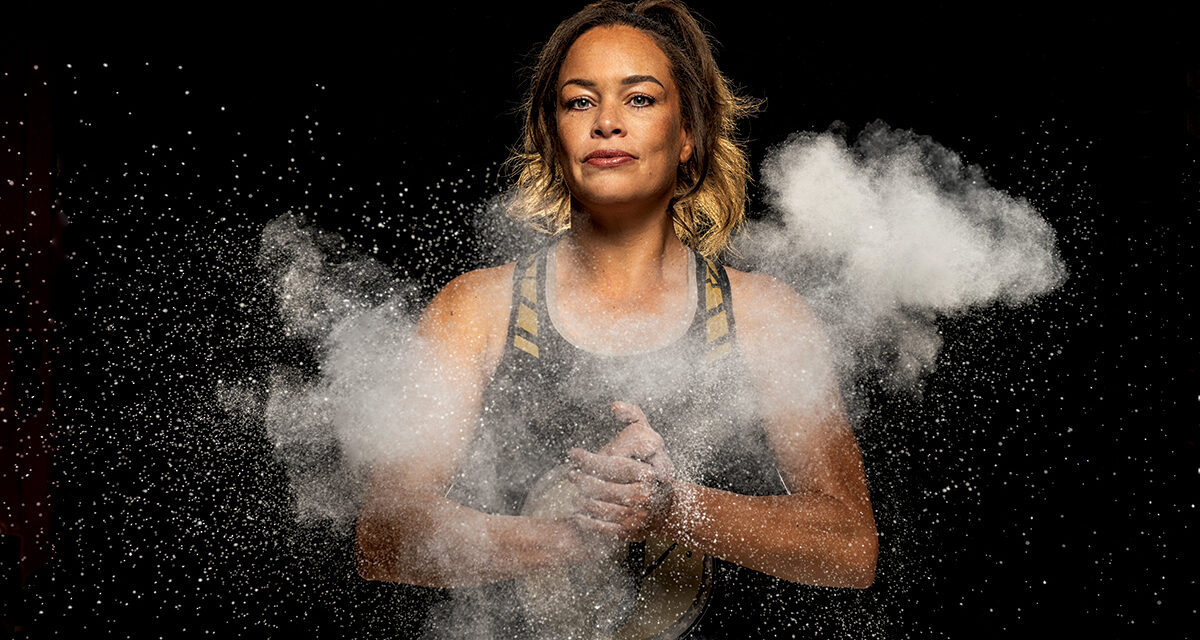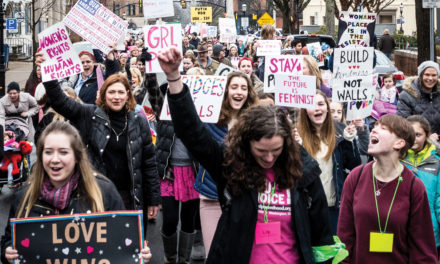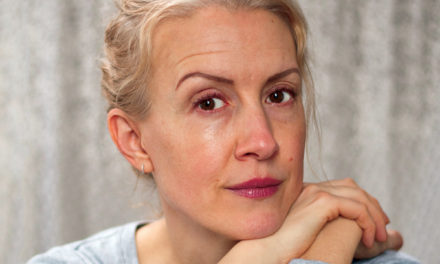
There was a reason I got into a sport like wrestling. I could channel anger in a positive way. But my breakthrough wasn’t happening because my mindset wasn’t as strong as it could have been. When I focused on my strengths instead of things that were wrong, that’s when I was at my best.
At this point, decades after it happened, the dare is legendary. Rancocas Valley Regional High School Wrestling Coach Brian Bowker challenged high school senior Leigh Jaynes to join the boys’ wrestling team, reasoning that she had an edge to her that could be channeled into excellence in wrestling. It was a wild idea. For one thing, she’d be the only female on the team in a sport that was, at the time, completely dominated by boys and men. His intuition told him she had something, even if he couldn’t have known the heights to which she would ascend in the sport or how she’d help pave the way for generations to come in women’s wrestling.
Back then, even Jaynes herself didn’t know the drive and grit she had inside her. Having faced so much adversity by her senior year in high school, achieving greatness might have seemed out of reach. As a result of an unstable living situation and the quick trigger of the State of New Jersey imposing crisis intervention, Jaynes found herself tangled in the child welfare spiderweb by the time she was 11 years old.
The details of what happened to her family are dizzying and painful. Her dad struggled with post-traumatic stress disorder brought on by his experience in the Vietnam War, and he spent time in jail for drug-related offenses. Her mother ended up raising her older brother and Jaynes all on her own. “My mother was very stressed out, really struggling financially, and she reached out for help. That’s when the State really probed into every part of our lives, and eventually a judge ruled that it was in my best interest to be placed in the care of the State,” she says. “I was in a group home from 12 years old till 16 years old, where I became emancipated from custody.”
In those intervening years, Jaynes tumbled through a spin cycle of painful experiences, from living in the group home, to a stint in a psychiatric ward, to sexual assault, to emotional turmoil, she says. “The world had sort of crashed down around me, and I was dealing with so much sadness, like deep, deep, deep in my soul. Everything just felt so fractured. We were all dealing with so much, including the stigma that came along with all of it for my mom and for us,” Jaynes says. “It was all very complicated to process as a child.”
Jaynes carried on, albeit with a chip on her shoulder and a scowl on her face. But she was driven. She got straight A’s in her classes, she played sports, and she joined a youth group, which was led by Coach Bowker. On a rock-climbing trip with the group, Bowker challenged her. “He said, ‘I bet you wouldn’t last 2 weeks in the wrestling room. You’re not tough enough.’ That moment changed my life. It was the catalyst for the end of the pity party and the start of fighting for what I wanted, eliminating excuses, and having a success-based approach, which helped me get to a better place and better circumstances.”
Wrestling Maneuvers
Jaynes was, it turned out, tough enough to compete on the boys’ wrestling team, despite the fact that she was “totally terrible” at first. “I had to get up off the mat again and again. I had one win that whole season [wrestling against the boys], but that win was the happiest time I’d had in years,” Jaynes recalls. “I realized quickly that to be good at this sport that I was learning to love, I was going to have to grind it out, and it was going to be painful and messy, which suited me pretty well.”
That summer, Jaynes competed at USGWA National Championship in Flint, MI, and her skills were put to the test wrestling against other girls. “When I got the opportunity to compete against other women, I was good, and I ended up placing in the top six in the nation, and that was enough to qualify for All-American and USA Wrestling.”
After high school, Jaynes went to Missouri Valley College to get her Bachelor’s degree in exercise science and to wrestle for the women’s team, one of only five in the country at the time. Since all the best wrestling talent was filtered into so few schools, the competition was stiff, and Jaynes struggled to succeed on the mat. Knowing she lacked discipline and in need of money, she enlisted in the Army in 2002 as a combat medic, serving at the 325th Field Hospital in Independence, MO, doing drill duty while continuing at college. That was the beginning of her 16 years in the military, which she describes as one of the best decisions she ever made, affording her opportunities, including a master’s degree in management. “I liked working in the hospital, and I found it suited me,” she says. “It gave me the opportunity to wrestle for [Army], a world-class athletic program, for 8 years. I got to travel all over, getting paid active duty to play sports.”
Jaynes eventually became an Army officer, becoming Capt. Leigh Jaynes. Wrestling for Army meant a rigorous training regimen. The team trained 6 days a week, sometimes twice a day. She was also exposed to other aspects of sports at that level, including sports psychology and media training. “There was one point where I was home only 4 days out of the year because we were traveling around to so many appearances, clinics, camps, and competitions,” she says. “I never thought that I would be standing at the Olympic Training Center competing for the United States Army and doing all these incredible things. I was just the girl who left home and never looked back and just kind of kept climbing. I just kept on going.”
Mark on the Mat
Jaynes describes her wrestling style as unconventional and spunky. She was strategic, understood angles, and could work her way through just about any position. One unexpected position she had to work her way out of was USA Wrestling’s plan to terminate her contract when she had a baby named Evelyn with her then-husband Ben Provisor, a Greco-Roman wrestler who competed in the 2012 and 2016 Olympics. “One of my coaches fought for me to continue doing physical therapy, and I was able to stay in shape,” Jaynes says. “In the end, I was one of the first athletes to go through a pregnancy and return to wrestling. I had to fight for it. Now women return from having kids more regularly, but nobody had gone through it before.”
Her return to wrestling was threatened when the family of three were in a terrible car crash on Father’s Day weekend in 2015. “[Provisor] turned left, and we got hit by an SUV. Our car rolled, and it was horrific,” Jaynes says. “Afterward, I had a memory like a fish. I couldn’t remember what my coaches were saying. One time, I took off my shoes in the weight room for no reason. Another time, I lost my bags in the airport, I missed my flight, and I started crying.”
Worst for Jaynes, she couldn’t pass a head injury test about 10 weeks before the World Wrestling Championships. But she kept battling and was set to compete in the 60 kg weight class. But the day before the event, she was still 7 kilos over the weight limit. “I did what you do. Sauna, suit up, run on the treadmill, suit up again, and repeat until I got there.”
There was one other motivator, one she never saw coming. The team asked parents and family to write letters for the athletes and put them in their lockers. Jaynes received a letter from her mom apologizing for everything she and her brother went through during her youth, which was cathartic and helped her mom and her find understanding with each other. Then one more surprise: Her dad, whom she hadn’t seen in about 20 years, saw Jaynes competing in a wrestling event on ESPN, noticing her name on the back of her singlet, and he came to the World Wrestling Championships in Las Vegas to watch her wrestle for the first time.
Jaynes won bronze, having lost the gold medal match but bouncing back with a hard-fought bout with Irina Netreba from Azerbaijan. During the press conference after her win, Jaynes alluded to becoming a well-rounded wrestler. “It’s one thing to get beaten, and it’s another to be defeated. I got pinned [in the gold medal bout], but it’s sports. You’ve got to get up, dust yourself off, and go back out there and do it again. If I held onto that loss too long, I would not have been able to go back out there and win the medal that I have right now.”
A reporter then asked, “Ten years ago, would you have had the maturity to come back?” She replied, “I would have cried in my pillow, and I would have barely made it out there.”
That’s when a little voice from below shouted, “Yay, Mama!” Jaynes looked down with a grin, scooped up Evelyn, then a toddler, and plopped her on her lap. Evelyn then looked out at the reporters and said, “Mama wins.”


I didn’t want my daughter to start wrestling at a young age. But Evelyn is very determined, and she’s always been that way from birth. Since she was a toddler, she’s always wanted to compete. She’s in sixth grade, and she has won four New Jersey state titles in wrestling.


Leading the Way
Her big win in 2015 marked the high point in her career, but it started a new chapter of her story. She continued to wear a lot of hats, working in health care in medical billing and coding and, of course, coaching women’s wrestling, which continues to grow at all levels of the sport from youth to the WWE. On the one hand, Jaynes laments that it’s been such a battle for girls and women to have the same opportunities as boys and men to wrestle competitively. “So often girls in sports become leaders. They become more self-confident. They know how to work better as a team. But it’s been a long journey for women in the world of sports,” she explains. “It’s just been somewhat of a ridiculous journey in many ways because if you know wrestling builds character for boys—mental toughness and a good work ethic—why wouldn’t you want your girls to have access to it? That doesn’t make any sense to me.”
On the other hand, Jaynes doesn’t let a fight scare her. Instead, she’s in the trenches, getting involved in women’s wrestling in any way she can, including improving their competitive attire. “When I first started wrestling, we did not have good wrestling singlets—they were basically a high-cut version of the mens’. They weren’t fitted for women,” Jaynes says. When she was studying for her master’s degree in management, she decided she wanted to create new wrestling singlets that would be customized for girls’ and womens’ bodies. She took that idea to fruition with her business LJ Wrestling Inc., whose mission is to accommodate the need for women to have access to properly fitted, fully customizable singlets.
Women’s wrestling is gaining momentum at an impressive rate, and Jaynes says that’s here to stay. “Women wrestlers are a little different than athletes in some other sports. We don’t walk around like with our head in the clouds. Just the nature of the sport causes us to be extremely humble and approachable,” she says. “But there are big things ahead for this sport, and I’m proud of the part I’m playing in that.





